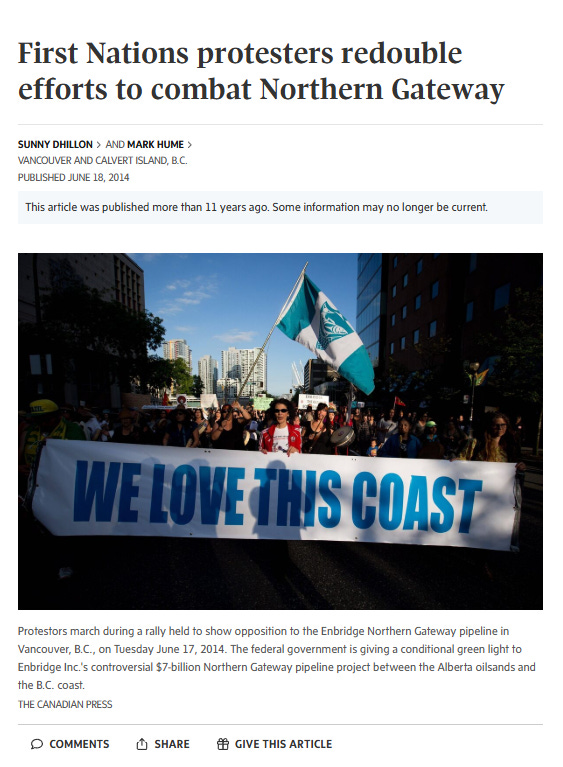The Oil Tanker Moratorium Act, known as Bill C-48, is back in the political spotlight, as Conservative leader Pierre Poilievre and Alberta Premier Danielle Smith double down on calls to repeal it. Framing the law as a barrier to jobs and prosperity, both leaders argue that opening B.C.’s remote northern coastline to oil tankers is essential to Canada’s energy future.
But beneath the rhetoric lies a question far more pressing: At what cost?
What is Bill C-48?
Passed in 2019 by the Trudeau government after the cancellation of the Northern Gateway pipeline, Bill C-48 bans oil tankers carrying more than 12,500 metric tonnes of crude or persistent petroleum products from stopping, loading, or unloading at ports along B.C.’s north coast, stretching from the northern tip of Vancouver Island to the Alaska border.
What’s still permitted under the law? Liquefied natural gas (LNG), diesel, and gasoline for local use are all allowed. The focus of the ban is on the types of oil most dangerous to the marine environment, persistent oils that do not evaporate, degrade, or float. These oils sink, coating the ocean floor and wreaking havoc on underwater ecosystems for decades.
Why Was It Passed?
The coastline in question is one of the most ecologically sensitive marine zones on Earth. It’s home to critically endangered southern resident orcas, threatened humpback and fin whales, and a complex web of species that rely on intact ocean habitats.
Tankers pose threats even before an accident happens, noise pollution from large vessels can disorient whales and disrupt migration and feeding. But the biggest danger remains a spill. In the cold, storm-prone waters of northern B.C., oil recovery would be nearly impossible. A single spill could devastate marine life and coastal ecosystems for generations.
What Would We Be Trading?
Despite what some politicians suggest, the economic benefits of lifting the ban are limited. At most, a pipeline to B.C.’s northwest coast would create around 400 permanent long-term jobs, according to government and industry estimates.
Compare that to the existing tourism industry:
B.C. tourism supports 125,000 jobs and generates $22 billion per year. (over 9 billion in GDP)
Coastal tourism alone, whale watching, kayaking, cultural tours, and fishing lodges, accounts for roughly a third of that.
That’s not just an economy, it’s a way of life. It’s also a key source of income for Indigenous communities, many of whom have opposed oil tanker traffic due to both environmental risk and lack of meaningful consultation.
Who Benefits?
Danielle Smith has said the pipeline could generate $20 billion per year in revenue, with 40% going to Alberta and the federal government. The lion’s share of profits, however, would land in the hands of oil and gas corporations, not coastal communities bearing the risk.
So we’re left with the central question:
Is it worth threatening tens of thousands of sustainable jobs and a fragile coastal ecosystem for 400 oil jobs and some federal royalty revenue?
This isn’t just a debate about energy policy, it’s about values. Do we prioritize long-term environmental stewardship and local economic resilience, or do we gamble it all on a boom-and-bust industry?
The coast is watching. And so are we.







We absolutely should not risk the cost. We’re in the midst of a climate crisis already! The cost is too great. But I can get on the both Smith and Poilievre spouting some BS about technology that supposedly “protects” marine life or that cleans up spills “quickly with minimal impact.” They’ve always got empty promises to counter legitimate opposition.
Conservatives are so hyper focused on moving oil for billionaires and have zero plans to diversify energy, support and fund renewable energy sources, or bolster industries like tourism that are already thriving and benefiting Canadians more.
It’s unsurprising that conservatives so quickly and easily dismiss real environmental and habitat threats in the name of “the economy,” but it’s baffling how many people fall for it (all while they complain about flash floods, wildfire smoke, drought, and unprecedented heat).
The UCP is happy to destroy caribou habitats (which threatens their existence) because they want to sell our forests to foreign logging corporations. And they’re eager to allow Australian billionaire Gina Reinhart’s mining company to release toxic levels of selenium into Alberta’s headwaters—not to mention using exorbitant amounts of our freshwater amid drought—for a mediocre boost in jobs and abysmal profits for the province.
So of course, Smith and Poilievre are willing to sacrifice BC’s coastal communities, waterways, and marine life. They only care about helping their billionaire friends while they lie to Canadians about how important fossil fuels are to our economy. I’m beyond exhausted with this rhetoric and the people who eat it up.
Interesting how Poilievre and Sith want Federal support to impose something on another province for the benefit of their province, while at the same time threatening separation because “it’s not fair” for Alberta to be “burdened” with the needs of the rest of the country. So it’s “Alberta’s” oil & gas, but it’s the “Canadian” coast? The arrogance and entitlement is astounding.